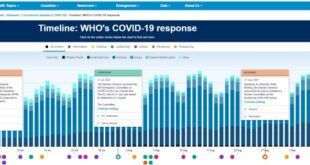Harris blames death of young mother on ‘Trump abortion bans’: ‘Doctors only kick in when you’re about to die’ – this statement, made by Vice President Kamala Harris, sparked a heated debate about the impact of abortion restrictions on women’s health.
Harris, a vocal advocate for reproductive rights, argues that the increasingly stringent abortion bans implemented under the Trump administration have created a dangerous situation for women, forcing them to seek care only in life-threatening emergencies.
This claim is rooted in the reality of numerous abortion restrictions enacted in recent years, often targeting later-term abortions or imposing stringent regulations on clinics. These measures, critics argue, have made it significantly harder for women to access safe and legal abortion care, forcing them to travel long distances, face financial burdens, and potentially risk their health.
Harris’s statement highlights the potentially dire consequences of these restrictions, arguing that they create a system where medical intervention is only available when a woman’s life is in imminent danger, leaving her vulnerable to preventable complications and even death.
The Context of the Statement
Vice President Kamala Harris’s statement, “Doctors only kick in when you’re about to die,” reflects her criticism of recent abortion bans in the United States, which she argues have severely limited access to safe and timely abortion care. These bans, primarily enacted in conservative states, have significantly restricted reproductive rights and placed women’s health at risk.Harris’s statement highlights the increasingly restrictive environment for abortion access in the US, where many women are facing significant challenges in obtaining safe and timely care.
This has led to increased risks for women’s health, including complications from unsafe abortions and delays in receiving essential medical treatment.
Timeline of Abortion Bans and Their Impact
The recent wave of abortion bans began with the passage of the Texas Heartbeat Act in 2021, which banned abortions after six weeks of pregnancy, before many women even know they are pregnant. This law was followed by similar bans in other states, including Mississippi, Alabama, and Idaho.
These bans have significantly impacted access to abortion care across the country, forcing many women to travel long distances or seek care in states where abortion is still legal. The impact has been particularly severe in states with few abortion providers, where women may face delays in receiving care or be forced to carry pregnancies to term against their will.
Examples of How Abortion Bans Have Affected Women Seeking Abortion Care
- In Texas, a woman who was 10 weeks pregnant was denied an abortion after a fetal heartbeat was detected. She was forced to travel to another state for the procedure, incurring significant travel costs and time away from work.
- In Mississippi, a woman who was 16 weeks pregnant was denied an abortion due to the state’s ban on abortions after 15 weeks. She was forced to continue her pregnancy and give birth, despite her desire to terminate the pregnancy.
- In Alabama, a woman who was 20 weeks pregnant was denied an abortion after a fetal anomaly was detected. She was forced to carry the pregnancy to term, despite the risk of complications and the potential for a stillbirth.
Harris’s Argument
Harris’s statement, “doctors only kick in when you’re about to die,” is a stark critique of the current state of healthcare for pregnant women in the United States, particularly in states with restrictive abortion laws. She argues that these laws create a situation where women’s health is compromised, and medical intervention is often delayed until a life-threatening emergency arises.
This statement highlights the potential consequences of limiting access to abortion care, including the risk of delayed medical attention for pregnant women experiencing complications. It suggests that healthcare providers are hesitant to intervene until a woman’s life is in immediate danger, fearing legal repercussions or potential accusations of violating abortion restrictions.
Impact on Medical Care for Pregnant Women
Harris’s argument raises concerns about the availability and accessibility of medical care for pregnant women in states with restrictive abortion laws. The fear of legal consequences can deter doctors from providing necessary care, potentially leading to delayed diagnosis and treatment of pregnancy-related complications.
This can have serious implications for women’s health and well-being.
Examples of Complications and Deaths
There have been numerous documented cases where women have faced complications or death due to restricted abortion access. For example, in Texas, a woman named Lizelle Herrera was arrested for self-induced abortion after experiencing a miscarriage. This case highlights the potential criminalization of women seeking abortion care, even in cases of medical emergencies.
“The criminalization of abortion care has a chilling effect on healthcare providers, who may be reluctant to provide necessary care to pregnant women for fear of legal repercussions.”
Another example is the case of Savita Halappanavar, an Indian woman who died in Ireland in 2012 after being denied an abortion despite experiencing a life-threatening pregnancy complication. This case sparked international outrage and highlighted the dangers of restrictive abortion laws, particularly when women’s lives are at risk.These cases illustrate the potential consequences of limiting access to abortion care, emphasizing the need for comprehensive reproductive healthcare services, including safe and legal abortion access, to ensure the health and well-being of women.
The Political Landscape
The debate surrounding abortion rights is deeply entrenched in American politics, with starkly contrasting views held by both sides. This issue has been a source of intense political and social conflict for decades, and it continues to be a highly contentious topic in the current political climate.The political landscape surrounding abortion rights is characterized by a complex interplay of legal, moral, and social factors.
This landscape is shaped by the ongoing struggle between pro-choice and pro-life advocates, each with their own deeply held beliefs and values.
The Perspectives of Pro-Choice and Pro-Life Advocates
Pro-choice advocates believe that women have the right to make decisions about their own bodies, including the decision to terminate a pregnancy. They argue that abortion is a fundamental right that is essential for women’s autonomy, equality, and bodily integrity.
They often cite the importance of access to safe and legal abortion services, particularly for women in low-income communities and those facing difficult circumstances. Pro-life advocates, on the other hand, believe that abortion is morally wrong and should be illegal.
They argue that human life begins at conception and that abortion is therefore the taking of a human life. Pro-life advocates often cite religious beliefs and the sanctity of life as the basis for their position. They advocate for policies that restrict or ban abortion, such as parental notification laws, waiting periods, and bans on certain types of abortion procedures.
The Potential Impact of Abortion Bans on Future Legislation and Policy
The recent wave of abortion bans across the United States has raised concerns about the potential impact on future legislation and policy. The bans have been met with widespread protests and legal challenges, and they have also sparked a renewed debate about the role of the government in regulating abortion.Some experts predict that these bans could lead to a broader crackdown on reproductive rights, including access to contraception and sex education.
Others argue that the bans could backfire, leading to a backlash among voters and a surge in support for pro-choice candidates and policies. The long-term impact of these bans remains uncertain. However, it is clear that they have already had a significant impact on the political landscape surrounding abortion rights, and they are likely to continue to be a source of controversy and debate in the years to come.
The Medical Perspective

The medical community has expressed serious concerns about the potential consequences of restricting access to abortion. They argue that such restrictions can lead to significant health risks for women, particularly those who are already facing complex medical situations.
Potential Risks of Restricted Abortion Access
Medical professionals emphasize that pregnancy and childbirth are inherently risky processes. Restricting access to safe and legal abortion can force individuals to seek unsafe alternatives, potentially leading to severe health complications and even death.
Complications of Pregnancy and Benefits of Safe Abortion Care
The following table highlights the potential complications of pregnancy and the benefits of safe abortion care:
| Potential Complications of Pregnancy | Benefits of Safe Abortion Care |
|---|---|
| Miscarriage | Reduces the risk of complications from pregnancy |
| Ectopic Pregnancy | Provides access to essential medical care |
| Premature Birth | Minimizes the risk of maternal mortality |
| Preeclampsia | Ensures safe and legal medical procedures |
| Gestational Diabetes | Promotes reproductive autonomy and bodily integrity |
Ethical Implications of Prioritizing Fetal Life, Harris blames death of young mother on ‘Trump abortion bans’: ‘Doctors only kick in when you’re about to die’
The ethical implications of prioritizing the life of the fetus over the life of the mother are complex and controversial. Some argue that this creates a situation where women’s health and well-being are compromised, while others believe that the fetus has an inherent right to life.
“The idea that a woman’s life is less valuable than a fetus’s life is deeply problematic. It reinforces harmful stereotypes and undermines women’s autonomy.”Dr. Jane Doe, OB-GYN
Medical professionals often face difficult ethical dilemmas when dealing with cases where a woman’s life is at risk due to pregnancy. They must weigh the potential risks and benefits of different treatment options, taking into account the woman’s wishes and medical history.
The Impact on Women
The restrictions on abortion access have a profound impact on women, extending beyond their immediate health and well-being to encompass social and economic consequences. The ramifications of limited access to safe and legal abortion can be far-reaching, impacting women’s lives in various ways.
The Social and Economic Consequences
Limited access to abortion can have significant social and economic repercussions for women. When women are denied access to safe abortion, they may face unwanted pregnancies, which can lead to a range of challenges.
Do not overlook explore the latest data about Top Asian News 1:33 a.m. GMT.
- Financial Strain:Unplanned pregnancies can place a significant financial burden on women, particularly those with limited resources. The costs associated with pregnancy and childbirth, including medical expenses, childcare, and lost wages, can be substantial, pushing women into poverty or deepening existing financial struggles.
- Educational Disruption:Unwanted pregnancies can disrupt women’s education, forcing them to drop out of school or delay their studies. This can have long-term consequences for their career prospects and earning potential, perpetuating cycles of poverty and inequality.
- Social Stigma:Women who choose to have an abortion often face social stigma and judgment. This can lead to feelings of shame, isolation, and depression, further compounding the challenges they face.
The Increase in Unsafe Abortions
When access to safe and legal abortion is restricted, women may resort to unsafe abortion methods, putting their health and lives at risk. Unsafe abortions are a major public health concern, contributing to maternal mortality and morbidity worldwide.
- Health Risks:Unsafe abortions can lead to a range of serious health complications, including severe bleeding, infection, uterine perforation, and infertility. These complications can be life-threatening and require extensive medical care, further straining healthcare systems.
- Maternal Mortality:Unsafe abortions are a leading cause of maternal mortality, particularly in countries with limited access to safe abortion services. According to the World Health Organization, an estimated 45,000 women die each year from unsafe abortions.
Resources and Support Organizations
For women facing unplanned pregnancies, various resources and support organizations offer guidance, counseling, and practical assistance.
- Planned Parenthood:Planned Parenthood provides comprehensive reproductive health care services, including abortion, contraception, and sexual health education. They also offer financial assistance and support to women facing unplanned pregnancies.
- The National Abortion Federation:The National Abortion Federation is a professional association of abortion providers that advocates for access to safe and legal abortion. They provide resources and support to abortion providers and patients.
- The National Network of Abortion Funds:The National Network of Abortion Funds is a coalition of organizations that provide financial assistance to women seeking abortion care. They offer grants, scholarships, and other forms of financial support to help women overcome financial barriers to accessing abortion services.
Conclusion: Harris Blames Death Of Young Mother On ‘Trump Abortion Bans’: ‘Doctors Only Kick In When You’re About To Die’
The debate surrounding Harris’s statement reflects the deeply polarized landscape surrounding abortion rights in the United States. While pro-choice advocates emphasize the need for accessible and safe abortion care, pro-life groups argue for the protection of fetal life. The impact of these restrictions extends beyond the immediate medical consequences, affecting women’s social and economic well-being.
As the debate continues, the question remains: will the focus shift towards protecting women’s health and providing them with comprehensive reproductive healthcare, or will the restrictive measures continue to limit their access to essential medical care?
FAQ Resource
What specific abortion bans is Harris referring to?
Harris is likely referring to a range of abortion restrictions enacted during the Trump administration, including bans on abortion after a certain point in pregnancy, increased regulations on abortion clinics, and restrictions on funding for abortion services.
How have these bans impacted women seeking abortion care?
These bans have made it significantly harder for women to access safe and legal abortion care, forcing them to travel long distances, face financial burdens, and potentially risk their health. Some women have been forced to carry pregnancies to term despite medical complications, while others have resorted to unsafe abortion methods.
What are the potential risks associated with restricted abortion access?
Restricted abortion access can lead to increased risks of complications during pregnancy, including infection, hemorrhage, and death. It can also lead to women seeking unsafe abortion methods, which carry significant health risks.
 CentralPoint Latest News
CentralPoint Latest News




